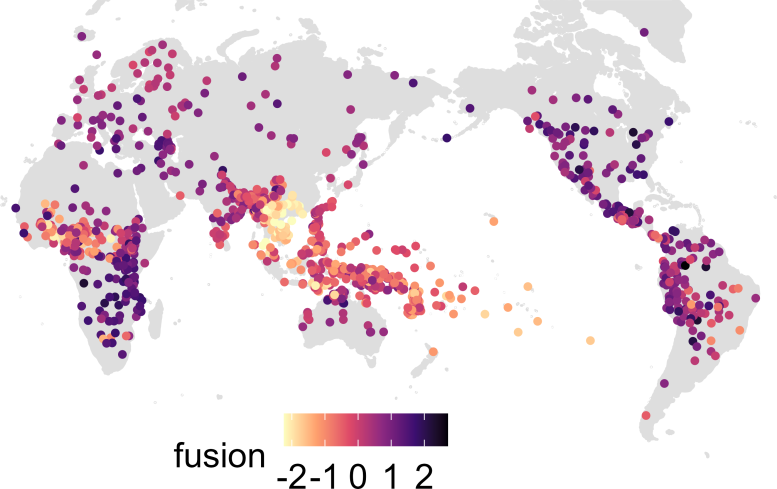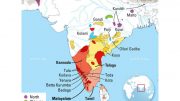
Languages vary significantly in grammatical distinctions, a difference even seen among closely related languages. A new study has found that societal size and non-native speakers don’t simplify a language’s grammar; rather, changes in grammatical complexity accumulate slowly.
Recent research indicates that grammatical complexity is not influenced by social surroundings.
Languages globally exhibit significant variations in their grammatical nuances. Such differences can be seen even among languages that share a close lineage. For instance, speakers of Swedish, Danish, and Norwegian all use the term hunden to denote “the dog”. This word serves to convey situations like the dog being inside the house, someone discovering the dog, or feeding it.
In Icelandic, on the other hand, three different word forms would be used in these situations, corresponding to the nominative, accusative, and dative case respectively: hundurinn, hundinn, and hundinum.
This grammatical distinction in the case system, along with many others, sets Icelandic apart from its closely related sister languages.
“One prominent hypothesis about why some languages show more complex grammar than others links grammatical complexity to the social environments in which these languages are used,” says first author Olena Shcherbakova from the Max Planck Institute for Evolutionary Anthropology.
For example, Icelandic is primarily learned and used by the local population of over 350,000 people. Such relatively small isolated communities are also called ‘societies of intimates’. In contrast, the other Scandinavian countries, located in close proximity to their neighbors, have larger populations with substantial proportions of non-native speakers. Such communities are known as ‘societies of strangers’.

The global distribution of grammatical complexity (fusion). Closely related languages resemble each other’s scores. Credit: Olena Shcherbakova et al., Science Advances (2023)
Many linguists have claimed that languages with more non-native speakers tend to simplify their grammars as, unlike children, adult learners struggle to acquire complex grammatical rules to master the intricacies of their new language.
But is this Icelandic example representative of the striking linguistic diversity worldwide? Researchers at the Max Planck Institute of Evolutionary Anthropology wanted to find out if the grammars of languages tends to evolve simpler when spoken by larger societies of strangers with many non-native speakers. They measured the grammatical complexity of 1,314 languages using data from Grambank – a newly released global database of grammatical features. These complexity scores were compared to variables detailing the number of non-native speakers in these languages.
Defining complexity
Language complexity is a hotly debated topic in linguistics, with many different opposing views. “Many of the disagreements are down to differences in how ‘complexity’ is defined,” says Hedvig Skirgård from the Max Planck Institute of Evolutionary Anthropology. “In this study, we improved the methodology by teasing out two distinct measures: fusion (how many affixes verbs and nouns have) and informativity (how many distinctions are made).”
The results show that societies of strangers do not speak less complex languages. “Instead, our study reveals that the variation in grammatical complexity generally accumulates too slowly to adapt to the immediate environment,” states Shcherbakova. The well-known counter-example to the claim about social environment shaping grammatical complexity is German. German is learned and spoken by a large number of non-native speakers and yet, it retained its case system and many other grammatical distinctions.
The study tests the influence of social environment on grammatical complexity, while accounting for the expected similarities arising from both genealogical inheritance and contact. “Our study highlights the significance of using large-scale data and accounting for the influence of inheritance and contact when addressing long-standing questions about the evolution of languages. It shows how received linguistic wisdom can be rigorously tested with the global datasets that are increasingly becoming available,” concludes Simon Greenhill from the University of Auckland.
Reference: “Societies of strangers do not speak less complex languages” by Olena Shcherbakova, Susanne Maria Michaelis, Hannah J. Haynie, Sam Passmore, Volker Gast, Russell D. Gray, Simon J. Greenhill, Damián E. Blasi and Hedvig Skirgård, 16 August 2023, Science Advances.
DOI: 10.1126/sciadv.adf7704
The study was funded by the Max Planck Society, a Branco Weiss Fellowship – Society in Science, and a Harvard Data Science Fellowship.









Be the first to comment on "Challenging Linguistic Assumptions: Size of Society Doesn’t Dictate Grammar Complexity"